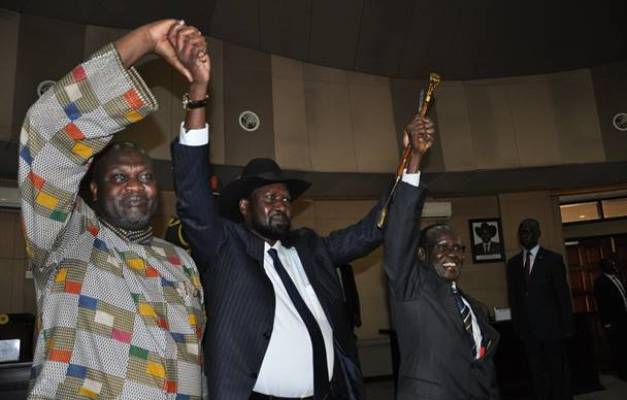Kiir’s government wants Machar out of unity government
August 24, 2016 (JUBA) – The South Sudanese government under the leadership of President Salva Kiir say they wished their peace partner and ex-First Vice President, Riek Machar does not return to Juba and assume his position in the coalition government.

Presidential advisor on decentralization and intergovernmental linkages, Tor Deng Mawien, described the implementation of the agreement to be moving at rapid speed with the appointment of Taban Deng Gai as the replacement of Machar after he was unilaterally removed from his capacity as First Vice President by Kiir due to his absence.
“Anybody who has been following the turns of events and the level of movement would appreciate the speed at which the president has demonstrated his commitment to implementing the peace agreement because he has now found a partner. General Taban Deng Gai has demonstrated willingness to working collaboratively with the president to implement the peace agreement so that to move the country forward. This is what is very important. It is not who occupies which position,” Mawien, a relative and a strong political ally of President Kiir, said during an exclusive interview with Sudan Tribune.
Mawien said it was now time for the region and the international community at large to extend a helping hand and work together with the current transitional government of national unity as recommended by the outcome of the communique of the Intergovernmental Authority on Development (IGAD).
“With such changes taking place within the presidency, where there is now a better working relationship, the region and the international community should take advantage of this new spirit and the working environment of cooperation to come out and extend support to implement the agreement,” he said.
Meanwhile, Gordon Buay, one of the senior representatives at South Sudanese embassy in the United States, claimed that the world was now accepting the appointment of Gai because they have realised that it was not easy for president Kiir to work together with Machar.
“The entire world is convinced that Riek Machar cannot work together with President Kiir given the incident of July, 8, this year coupled with December, 15, 2013. Therefore, the world accepted Taban Deng Gai to implement the peace [agreement] with President Kiir simply because bringing back Riek Machar to Juba to the Presidential Palace is like lightening a match near kerosene or benzene. The result is fire, fire, fire, fire, fire and fire,” Buay told Sudan Tribune on Wednesday from Washington DC.
He claimed further that the world leaders have reached a logical conclusion that Riek Machar has no place in the transitional government of national unity because he is purportedly “a combustible product that can easily explode and kill people.”
Gai, on the other hand, he described, is like “an air condition that cools the room. He is the right person to work with President Kiir to cool South Sudan.
However, both IGAD communiqué and United Nations Security Council’s resolutions criticized the replacement of Machar as “inconsistent” with the peace agreement and called for reinstatement of Machar to his position as First Vice President.
Observers are keen to underline that the speed at which the assembly reconstitution and after the replacement of Machar suggests there was an underground conspiracy to remove him from office and replace him with someone who would not stick to implementation of the key provisions in the deal.
President Kiir himself announced at the opening of the assembly that the delay was due to petty political differences and lack of better working relationship between him and Machar at the time.
He declared he would from the time of opening the assembly work collaboratively with Gai to implement the agreement. Gai declared at the inaugural function of his appointment that there was no need for two armies in the country and president Kiir was the only existing commander in chief in the country.
(ST)
